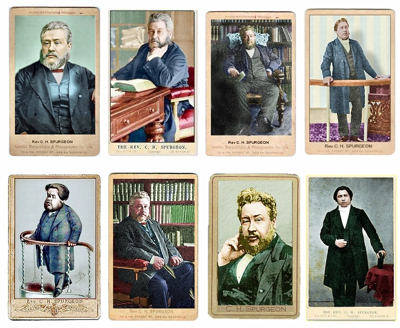Your weekly Dose of Spurgeon
The PyroManiacs devote some space each weekend to highlights from the lifetime of works from the Prince of Preachers, Charles Haddon Spurgeon. The following excerpt is from Words of Cheer, pages 36-37, Pilgrim Publications.
"God the Holy Ghost is a very loving Comforter."
I am in distress, and want consolation. Some passer-by hears of my sorrow, and he steps within, sits down and essays to cheer me; he speaks soothing words; but he loves me not, he is a stranger, he knows me not at all, he has only come in to try his skill; and what is the consequence? His words run o’er me like oil upon a slab of marble—they are like the pattering rain upon the rock; they do not break my grief; it stands unmoved as adamant, because he has no love for me.
But let some one who loves me dearly as his own life come and plead with me, then truly his words are music; they taste like honey; he knows the password of the doors of my heart, and my ear is attentive to every word; I catch the intonation of each syllable as it falls, for it is like the harmony of the harps of heaven.
Oh, there is a voice in love, it speaks a language which is its own, it is an idiom and an accent which none can mimic; wisdom cannot imitate it; oratory cannot attain unto it; it is love alone which can reach the mourning heart; love is the only handkerchief which can wipe the mourner’s tears away.
And is not the Holy Ghost a loving Comforter? Dost thou know, O saint, how much the Holy Spirit loves thee? Canst thou measure the love of the Spirit? Dost thou know how great is the affection of His soul towards thee? Go, measure heaven with thy span; go, weigh the mountains in the scales; go, take the ocean’s water, and tell each drop; go, count the sand upon the sea’s wide shore; and when thou hast accomplished this, thou canst tell how much He loveth thee.
He has loved thee long; He has loved thee well; He loved thee ever; and He still shall love thee. Surely He is the person to comfort thee, because He loves. Admit Him, then, to your heart, O Christian that He may comfort you in your distress.


 n 1942, Englishman C.S. Lewis published a book entitled The Screwtape Letters.
n 1942, Englishman C.S. Lewis published a book entitled The Screwtape Letters.  In it, a senior devil named Screwtape details to his nephew and underling Wormwood methods for waylaying and ultimately damning his intended victim. The book is a clever and revealing look at how the actual devil, Satan, goes about perpetrating his odious work in the world. One overarching theme behind Screwtape's instruction to Wormwood is how the subtle provocation away from truth is usually more helpful in bringing souls to hell than blatant exposures to deplorable sins. Writes Screwtape to his young apprentice, "Indeed the safest road to Hell is the gradual one—the gentle slope, soft underfoot, without sudden turnings, without milestones, without signposts . . . ."
In it, a senior devil named Screwtape details to his nephew and underling Wormwood methods for waylaying and ultimately damning his intended victim. The book is a clever and revealing look at how the actual devil, Satan, goes about perpetrating his odious work in the world. One overarching theme behind Screwtape's instruction to Wormwood is how the subtle provocation away from truth is usually more helpful in bringing souls to hell than blatant exposures to deplorable sins. Writes Screwtape to his young apprentice, "Indeed the safest road to Hell is the gradual one—the gentle slope, soft underfoot, without sudden turnings, without milestones, without signposts . . . ."
 This is, of course, baldly refuted throughout Scripture. You know, dear Wormwood, that the prayers and other acts of service done by those who have not yet been redeemed by our Enemy through repentance and faith are an abomination to Him (Prov. 15:8; 28:9; Isa. 64:6). In fact, this is nothing other than legalism, that old tried and true tactic perfected by the Pharisees, yet still a compelling vice all these years later. This falsehood remains enticing because sinners warm to the idea that they might offer works to be approved by our Enemy, and recoil at being told they can do nothing to merit His acceptance. The endurance and flourishing of legalism explains how much of the professing Church today is bursting with spiritual activity and service rendered to our Enemy with absolutely no clue how to be truly reconciled to Him (2 Cor. 5:18-21).
This is, of course, baldly refuted throughout Scripture. You know, dear Wormwood, that the prayers and other acts of service done by those who have not yet been redeemed by our Enemy through repentance and faith are an abomination to Him (Prov. 15:8; 28:9; Isa. 64:6). In fact, this is nothing other than legalism, that old tried and true tactic perfected by the Pharisees, yet still a compelling vice all these years later. This falsehood remains enticing because sinners warm to the idea that they might offer works to be approved by our Enemy, and recoil at being told they can do nothing to merit His acceptance. The endurance and flourishing of legalism explains how much of the professing Church today is bursting with spiritual activity and service rendered to our Enemy with absolutely no clue how to be truly reconciled to Him (2 Cor. 5:18-21).
 Dr. Eakin is a sports medicine orthopædic surgeon in the Bay Area and part time teacher at Grace Bible Fellowship Church's Stanford campus ministry. He is the author of
Dr. Eakin is a sports medicine orthopædic surgeon in the Bay Area and part time teacher at Grace Bible Fellowship Church's Stanford campus ministry. He is the author of 
 t. Augustine desired to be always found aut precantem, aut predicantem; that is, either praying or preaching; either speaking to God for men in prayer, or speaking for God to men in his ministry. Ministers of Christ especially should give themselves, not to the serving of tables, but to the ministry of the word and to prayer. For us to give ourselves to getting up entertainments, to become competitors with theatres and music-halls, is a great degradation of our holy office. If I heard of a minister becoming a chimney-sweep to earn his living, I would honour him in both his callings; but for God's watchmen to become the world's showmen is a miserable business. God keep all of us who are ministers of Christ from entangling ourselves with the things of this life! The proverb says, "Stick to your last, cobbler"; and I would say—Stick to your pulpit, minister! Keep to your one work, and you will find quite enough for all the strength you have, and even more.
t. Augustine desired to be always found aut precantem, aut predicantem; that is, either praying or preaching; either speaking to God for men in prayer, or speaking for God to men in his ministry. Ministers of Christ especially should give themselves, not to the serving of tables, but to the ministry of the word and to prayer. For us to give ourselves to getting up entertainments, to become competitors with theatres and music-halls, is a great degradation of our holy office. If I heard of a minister becoming a chimney-sweep to earn his living, I would honour him in both his callings; but for God's watchmen to become the world's showmen is a miserable business. God keep all of us who are ministers of Christ from entangling ourselves with the things of this life! The proverb says, "Stick to your last, cobbler"; and I would say—Stick to your pulpit, minister! Keep to your one work, and you will find quite enough for all the strength you have, and even more.









